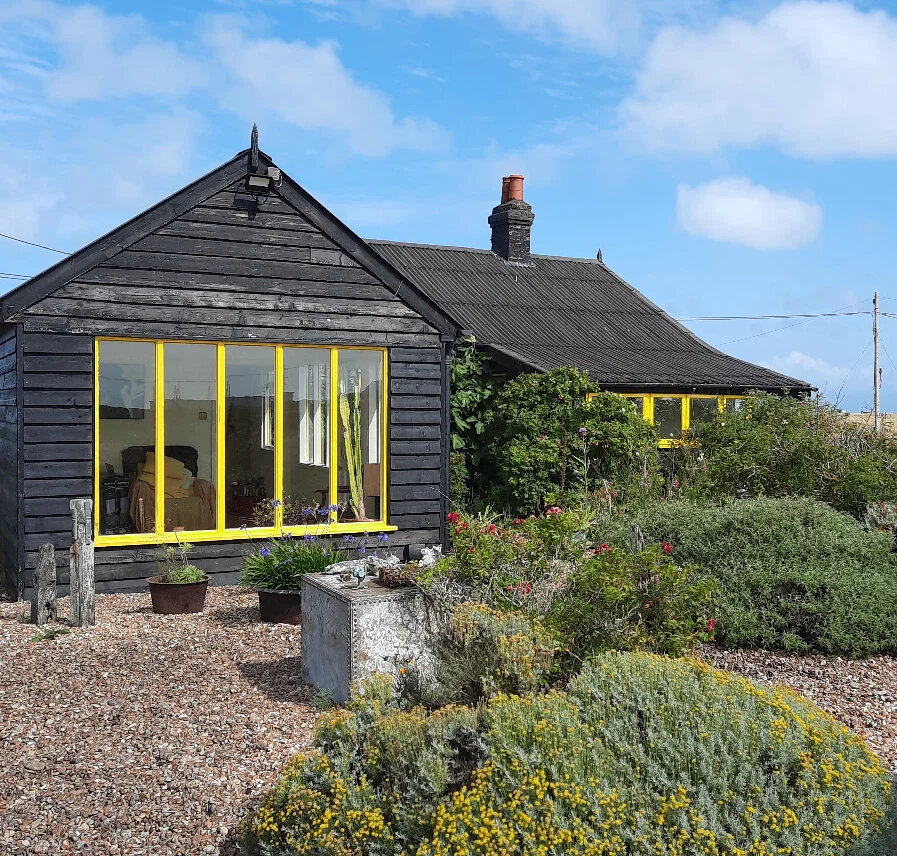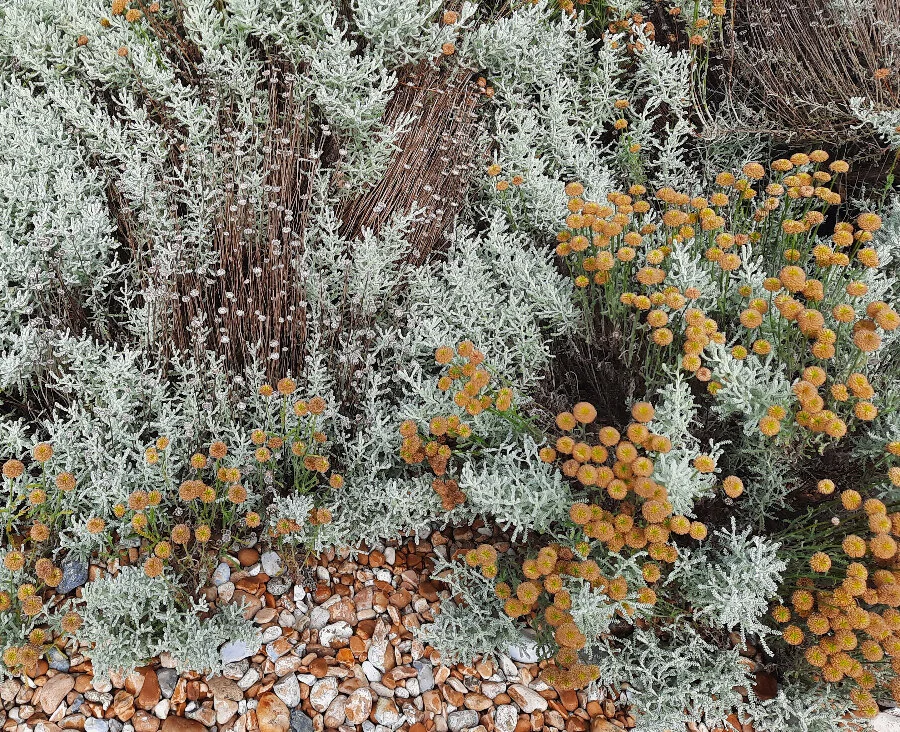From Dungeness – a letter to Derek Jarman
/By Jen Green:
August 6th, 2021
Dear Derek
I thought I’d update you on your garden, as you often wondered what would become of the flowers you planted in the shifting shingle. I’m sure though, you know exactly what’s going on at Prospect Cottage because part of you is still there.
I drove to Dungeness through the marshes, along roads with vast horizons that have the feel of dead-end tracks. After a seafood lunch at The Pilot and double checking the direction with the landlady, I walked up from there, battling blasts of wind. Trying to comprehend the basic elements of my surroundings; sky, sea, shingle, road, flatness, perceiving little more until reaching Prospect Cottage. I too dislike rules and boundaries but in a landscape it’s a strange experience, questioning what is seashore, what is inland, where gardens begin and end. A fishing boat rides a wave of pebbles. If I’d turned back for home now, I’d say Dungeness was monochrome, exposed. But I’d seen it through your eyes and it was never bleak, there was a lifetime of curiosity.
Your house is well kept, yellow window and door frames are bright against uniform black wood. My visit feels intrusive as I approach, so I busy my eyes with plants at shingle level and avoid looking inside. Tall fennel and salty-green domes of santolina fly flags of dry flowerheads. The wild mint you found on the Ness is still here, flowering purple amongst a Mediterranean aroma – but one I can never place or track down to an individual herb. Dots of magenta from sweet pea to roses to knapweed. Low-growing plants in front of the house are well suited to winds, tiny sedum and silvery sea kale. Behind, a fig tree claims the inside corner, covering a wall, palms curling with each gust. Is this the fig you nurtured from a cutting taken on your way home? It’s flourishing. Elder trees still guard the house, their old growth a crown of sticks covered by mustard-yellow lichen, and new growth rising. Just a rose bush between you and the power station prospect; the other way, the sea. Garden and creativity unbound, like the fun you and your friends made in the freedom of these waves and levels.
In between pebbles and plants are your markers of flotsam, driftwood, scrap metal triangles, hoops and spirals, all rusted. I imagined it as if you were a giant turnstone on the shore, gathering the best of Dungeness; armfuls of stones and pockets of shoots from rubbish tips and roadsides, for restoration back in the garden microcosm. Shells and stones elevated on sticks furnish the land with shape and relief. I can see how gardening gave you hope, taking action with tangible results, of some kind. Like an alchemist planting prescriptions with the guidance of Culpeper, for protection, for healing, for sleep. A guardian creating a living, vibrant memorial, each oval flint stone a friend, a life, standing in shingle as dolmen circles of moon and sun, with the resonance of being adjusted by your hands. As dragon’s teeth they deter a foot from stepping inside the jaws, defending sedum and poppies. Sempervivums live on. With sadness I see many stones, for friends who died young. Revolutionaries like yourself braved the wilderness of a new virus. Did you imagine that people living with HIV live full, long lives and with medication, HIV is untransmissible? Perhaps you did, as 30 years on is a long time. There’s one red hot poker, encircled by a rusted chain. When asked in an interview how you’d want to be remembered, you said a flower - a red hot poker so perhaps HB kept this one for you.
Climate change is a climate crisis, the years were getting hotter like your sunny, sweater-free birthday in January 1989. Nuclear power was not the answer and Dungeness B is now decommissioned.
Leaning to look into raised beds where terracotta pots are stacked, I find a musty but purposeful smell that could be my grandad’s shed. He kept a straight-lined, weed free vegetable garden, the kind that were common in suburbs but now replaced by driveways for cars that bring home vegetables from seasonless supermarkets.
Other uninvited visitors nose about and sneak between plants but don’t stay for long. Four children shelter from the wind by the house, pushing each other into the gusts where they struggle to stay upright, stomping in the pebbles. I worry about the proximity of a pink mallow at foot height, but it survives their game. Wind, with free rein over flat terrain, howls in telephone wires that cross to all the houses, reminding me of the Kansas tornado that lifted Dorothy’s house. I’m not sure I could live here, but you described so much beauty over the years. Sparkling dew on shingle, the theatre of a landscape with unimpeded sunrises and sunsets, where scenes can change with just one cloud.
When I left, with ears cold from the ceaseless blow, I snapped a poppy head and put it in my pocket. All the seeds fell out on the way home. My partner hasn’t tidied our garden since I’ve been away. July’s growth is too much to keep up with so Augusts are scruffy - ragged plants with dead sticks - out of proportion without foliage, overblown fluff, flattened long grass, half-eaten leaves and withered flowers. There is green but it’s tired. In the spring my neighbours shared their excess of spring shoots, of borage, nasturtiums and jasmine. Borage raised blue stars skywards one by one, raining seeds which I saved. Nasturtiums were quick to bloom and curl all over the hanging basket, but by late summer, their leaves and flowers are deformed and nibbled. What did you do about slugs? I tried Vaseline around the plant pot lip. One snail tried to cross but stopped, turned eyes inward, processing the gunk. The sunflower prematurely soured anyway, perhaps the pot was finally too small. It had been a seedling I’d saved from grass under the bird feeder, cupped in my hands like an ember to rekindle. Now, I’ve noticed seeds dislodged by chewing snails were caught by bare soil in a pot below, and summer’s flames are refuelled. The rose bush blooms regardless, sending out fast, straight limbs and as many bunches of fuchsia-pink roses as it can, long after all other flowers are over.
Oh I almost forgot, Prospect Cottage has been saved from private buyers, by friends and an organisation who will dedicate it to public interest. Seeds from your garden are free, germinating in all kinds of unusual places.
Yours,
Jen
***
Jen Green is a writer based in Bristol, UK. With a Masters in Travel & Nature Writing at Bath Spa University, she explores the role that nature plays in people’s lives; of trees, parks and a view of the sky. Jen has a portfolio website at jencgreen.com




